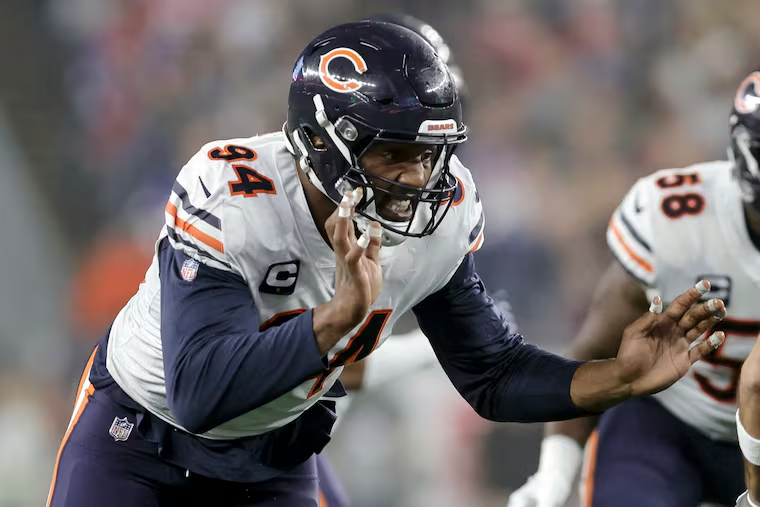The Robert Quinn trade is Howie Roseman’s latest smart attempt to win the Eagles another Super Bowl
It's a low-risk deal that lends talent and depth to the team's defensive line. It's also the kind of move that has become Roseman's trademark this time of year.

For the production he gave the Chicago Bears, for the money he was making, Robert Quinn has not been a good player this season.
Quinn has been one of the NFL’s elite pass-rushing defensive ends pretty much since he entered the league in 2011. The Bears, his fourth team, had signed him to a reported five-year, $70 million contract in 2020, a deal that paid him $7 million last year and nearly $13 million this year.
Last year, he had 18½ sacks. Last year, he was a bargain. A salary cap forces general managers and fans to think about athletes in those terms, of course, not as flesh-and-blood people, but as investments, as stocks, always rising and falling.
Quinn fell. Through the Bears’ seven games so far, he had one sack and had hit an opposing quarterback just three times. He is 32, at the edge of his prime, if one can still consider him to be in his prime, and though the Bears had signed him through the 2024 season, his contract guaranteed him no money in ‘23 or ‘24. So, once Quinn’s decline was obvious, it made sense for the Bears to say, Rather than cut him for nothing, let’s trade him now, ahead of the league’s Nov. 1 deadline, for something.
» READ MORE: Thumbs up or down: Eagles beat writers weigh in on Robert Quinn trade
Welcome once more to the world of high finance in pro football. Welcome once more to the world in which Howie Roseman is a king.
For the low-risk price of a fourth-round draft pick, the Eagles acquired Quinn on Wednesday afternoon. It was the latest sharp move by Roseman, the Eagles’ executive vice president of player personnel, a roster-builder who, for his obvious flaws, has positioned them to make another championship charge five years after they won the Super Bowl for the first time.
This is Roseman’s time. He has always loved to wheel and deal, and it has become an annual tradition, if the Eagles are contending for the NFC East title or more, to see what he will do, come the end of October, because it’s a safe bet he’ll do something.
Those somethings have helped to varying degrees. In 2019, Roseman traded a fourth-round pick at the deadline to Cleveland, for instance, for linebacker Genard Avery, who was barely any help. In 2018, Roseman sent a third-round pick to the Detroit Lions for wide receiver Golden Tate, a trade that didn’t benefit the Eagles much until Tate caught the game-winning touchdown pass from Nick Foles in a playoff victory … in Chicago against the Bears.
But the 2017 season is the most useful reference point for this season and this trade — and not just because the Eagles were the league’s best team that season and, at 6-0, have the league’s best record this season. At that season’s trade deadline, Roseman gave up a fourth-round pick to the Miami Dolphins for running back Jay Ajayi. The Eagles needed depth in their backfield, needed one more ballcarrier to form a potent committee with LeGarrette Blount and Corey Clement, and Ajayi was the perfect fit.
That’s all the Eagles will ask of Quinn. They will ask him to fit in. They don’t need him to be the Robert Quinn of 2013, when, while with the St. Louis Rams, he led the NFC with 19 sacks. They don’t need him to be the Robert Quinn of 2019, when he had 11½ sacks for the Dallas Cowboys. Which is good, because he is neither of those Robert Quinns. He’s not even the Robert Quinn of last year.
What he is, is an experienced professional with something still left to give, who doesn’t have to justify a high salary — to himself or the franchise that paid him — by being the dominant player his age won’t allow him to be anymore. The Bears reportedly are paying most of Quinn’s remaining salary this season, and instead of playing 68% of all defensive snaps for the Eagles, as he did for the Bears, Quinn will join coordinator Jonathan Gannon’s regular rotation of defensive linemen: Haason Reddick, Fletcher Cox, Brandon Graham, Josh Sweat, Javon Hargrave, Jordan Davis, and Milton Williams.
» READ MORE: ‘I hope they win it all’: Eagles’ Jalen Hurts, Nick Sirianni, A.J. Brown all pulling for World Series-bound Phillies
There’s a mix of young and old in that group, vets and up-and-comers. Peruse the stats related to pass defense, and the Eagles are in the league’s top 10 in several: sacks, knockdowns, and pressures. They have done well to harass and disrupt opposing quarterbacks, but they can be better. And remember: Graham is 34 and a part-time player now. Cox turns 32 in December. The more selective Gannon can be in when and how he plays them, the better they’ll be at their advanced football ages.
Quinn gives Gannon more options, more flexibility. In that context, for this team, with so little to lose, Robert Quinn can be a good player. This was a move worth making. This is Howie Roseman’s time of year.